One of the consummate actors of his generation, the English-born
Ralph Fiennes has earned not only numerous awards and nominations (Oscar
noms for his portrayal of Nazi war criminal Amon Goeth in 1993's
Schindler's List and for his performance as Count Almásy in 1996's
The English Patient) but also a huge geek fan base for efforts as
the evil Lord Voldemort from the Harry Potter film series
(2005–2011).
As the
Potter series ended, Fiennes went from the reign of one brutal dark
lord to portraying another when he made his directorial debut with a
film adaptation of Shakespeare's tragic Coriolanus — another tale
of a power hungry leader. The 51-year-old actor not only proven himself
behind the camera, but did double duty playing the lead. Fiennes then
won a Tony Award for playing Prince Hamlet on Broadway.
Thanks to this year's New York Film Festival, Fiennes' latest
directorial turn, The Invisible Woman, received the special
attention it deserved despite its rather obscure source material and
controversial story.
Though the secret 13-year love affair between Charles Dickens and
Nelly Ternan — which lasted until his death in 1870 — remained private
for a long time until Claire Tomalin's book came out, it is relevant
today. Dickens's status as the premier celebrity of his day (having
written many classics such as Great Expectations, A Tale of Two
Cities and A Christmas Carol) was not without a struggle to
find the balance between his public and private persona.
At an NYFF press conference preceding the film premiere screening,
Fiennes conducting a revealing discussion about his passion for
directing the film, playing Charles Dickens and working with a
remarkable Felicity Jones as Ternan.
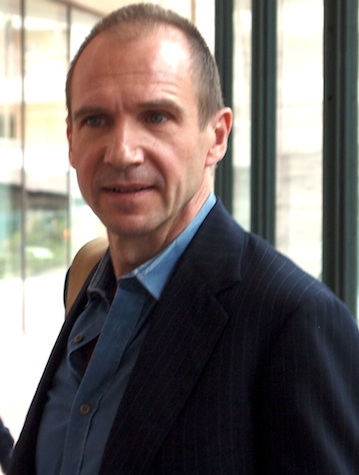 Few
people have read the book this film is based on, which was a revelation
in academic and literary circles though it hasn't had much effect on
Dickens in the popular imagination. Why did you want to make this film?
Few
people have read the book this film is based on, which was a revelation
in academic and literary circles though it hasn't had much effect on
Dickens in the popular imagination. Why did you want to make this film?
I was largely ignorant about Dickens's work and about Dickens
himself. I hadn't seen many adaptations. I hadn't ever chosen or been
asked to study Dickens.
I was handed this screenplay by Abi Morgan, which was an early
draft based on the book The Invisible Woman. The story of Nelly
Ternan affected me. In an early draft — which is very different from the
shooting script that we finally locked [on] — it was essentially a
similar structure of a woman living a life, married, running a school,
and then we go back in time and learn about her past.
I think what hooked me was the idea of someone carrying within them
an unresolved relationship. Then I read Claire's book and was smitten by
the story of Nelly Ternan.
Suddenly my eyes were opened to Dickens, in all his complexity and
many facets. I haven't read every single Dickens, but I gobbled up
David Copperfield, Bleak House and Great Expectations.
In
both this and
Coriolanus, a remarkable Shakespeare film, you are the
director/actor. Did you think twice about taking on that double
position?
I did think twice. With Coriolanus, it was very difficult
doing both.
When I was invited to do this, it came with the same invitation to
direct and to possibly play Dickens. I initially said, "No. I don't
think I could."
But in the process of working on the screenplay with Abi, I got to
rehearse things. I got to read, test and speak out loud in my kitchen
with Abi banging away on the computer.
I suppose I became enamored of the role of Dickens in the process.
Having said no and been reluctant, I then said, "I think I should play
him."
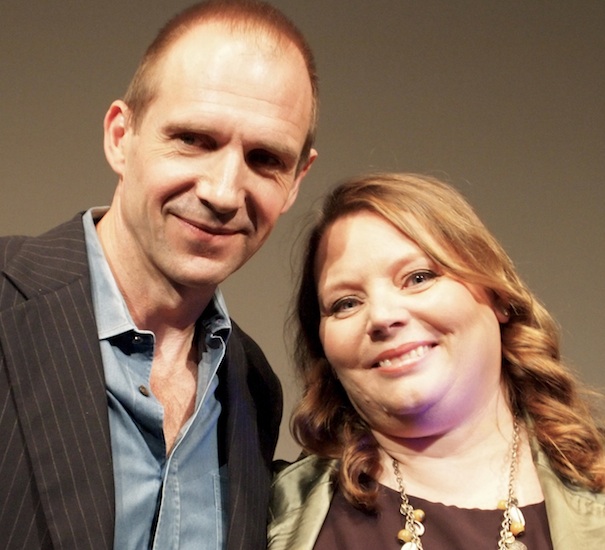 In
a way, the film has a double ending. It's a bit parallel to what is said
about the original ending of
Great Expectations and that he had to change it. Is that what you
were trying to do with the film?
In
a way, the film has a double ending. It's a bit parallel to what is said
about the original ending of
Great Expectations and that he had to change it. Is that what you
were trying to do with the film?
Well, there are two endings, I suppose. For the story of Dickens
and Nelly, this is the story of how she came to be the mistress of
Charles Dickens, not their life together. This wasn't going to be a full
biopic of Nelly Ternan or Charles Dickens.
It was her story, but the story I thought was dramatically the most
interesting was the path that led Nelly to say to Dickens, "Yes." The
choice was in the situations she was confronted with.
The final scene between them, which sets them up in the house,
that's the conclusion of that story. The other ending is the ending in
the school. I felt very strongly that we needed to have Nelly somehow
give utterance to what had happened to her.
The Reverend Benham, who was played by John Kavanagh, was a real
figure. Claire Tomalin writes about him in her book, and he was the only
person, apart from maybe her mother or her sisters, that [Nelly] talked
to. So I used the idea of Benham as someone who would listen.
She has been able to speak about it. It's given her a degree of
closure. But she goes back into her life and she says to her husband, "I
am here" — meaning "I am here fully for this continuing life with you."
And she sits there and watches a play with her son. It's a play
co-written by Charles Dickens. I want the audience to watch her face and
to engage with what she might be [thinking], which is a massive thing:
her life, the future, her son, the theater where she was an actress.
It's all those things.
Felicity [Jones] — who I'm very sorry can't be here because she's
filming — does an extraordinary piece of film acting in that one moment.
It's a mystery what goes through her. Her whole world goes through her
face.
Then we end on Abi Morgan's little epilogue from the play. I guess
it's better to have loved than to never have loved at all. For sure,
Dickens and the memory of Dickens will always be there.
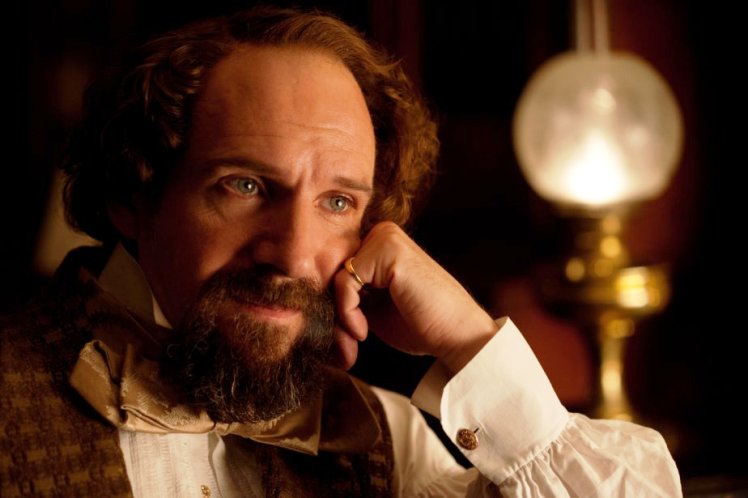 The
film is visually magnificent. You have incredible cinematography as well
as a great design team.
The
film is visually magnificent. You have incredible cinematography as well
as a great design team.
Yes, the design team — [production designer] Maria Djurkovic and
set designer Tatiana Macdonald. One of the things I love was that they
recently did Tinker Tailor Soldier Spy. We met and there was a
creative love there about the period detail.
We both agreed that we wanted to embrace that specific time as
accurately as possible. I did not want, nor did she, to give any kind of
spin or alternative version of this period.
It's a fascinating period of design, [with] incredible patterns and
colors. Some of it is very ugly, I think. The Victorian sense of dark
wood is amazing. I wanted Maria to embrace that and she loved that. She
was fantastic at the details. We wanted the details.
Michael O'Conner, who did the clothes, has been acknowledged many
times. The wardrobe room that he [used] was an amazing place to go,
because he found many original garments which he copied and remade.
I even got to wear one original Victorian waistcoat, in the
post-theater party scene in Manchester. It's a beautiful black
waistcoat, embroidered with tiny little grapes and vine leaves on the
lapel. That small detail was a turn-on.
And then Rob Hardy, who lit it — we had a very creative love
affair.
It's
shot in film?
Yes. It's a combination of Fuji and Kodak, I think.
Compositionally, it was important how we framed it. I wanted someone who
would help shoot very strong frames.
This was not going to be a camera that would rush around a great
deal, but was trying to look for the strength of composition that
essentially would bring your focus into the face of the subject, the
human, the character.
I really felt that the camera had to find the optimum place to view
the interior life that we were all going to try to inhabit, and get
inside.
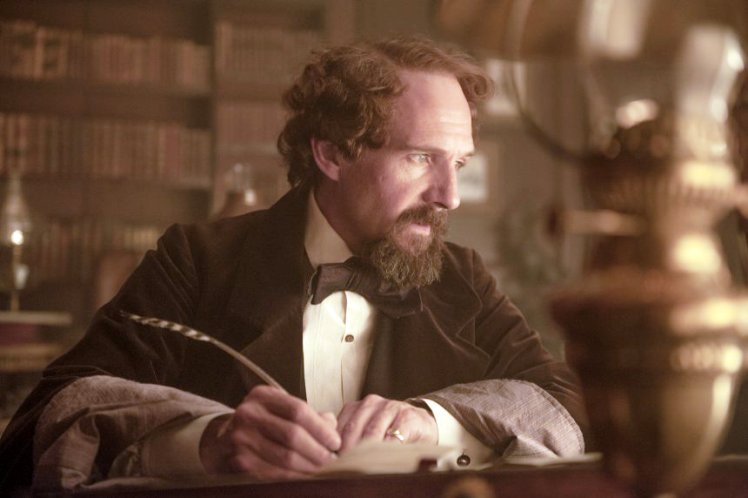 You
are an eloquent storyteller yourself, focusing on their faces and giving
them time to develop that.
You
are an eloquent storyteller yourself, focusing on their faces and giving
them time to develop that.
I think what a person is facing tells a story.
In
many of the sequences, you give the audience access from an unusual
perspective: not through the eyes of the character, but from behind
them.
I think [having] the camera literally behind them is very potent,
because backs of people's heads are a mystery. You want to know what's
around the corner from that person. If we're behind them, we imagine
what they're seeing.
When Catherine visits the Ternan home, I love the shot of the back
of her bonnet. The bonnet is a thing you have to embrace during this
period. It's a piece of feminine attire. It's protection that frames the
face. It's also got a protective armor-like quality, so I think there is
dramatic potential in that.
What is the face going to show me when I see it? I like watching
people whether coming towards or going away. I like this scene of Nelly
coming towards the church at the end. It's the silhouette.
The confession at the end is very important. The idea that if
someone can confess and give utterance to someone who will listen, I
think that's a really important thing to do.
Nelly doesn't speak. She doesn't express herself much. She's on the
receiving end of this sort of fury called Charles Dickens. She has to
make these choices. At last, she's found the courage and the ability
within herself to speak.
It starts on the beach. When you're walking on a beach you confront
your minisculeness and also confront your own essential humanness
against the wind and rain. Maybe that is personal to me, that I think
you can confront stuff on the beach when you walk.
That's why I like that she lived by the sea, but I wanted to
explore what it meant to live by the sea. For me, the walking was a
wrestling with these unresolved issues that she finds herself thinking
about.
In
this festival, the marvelous Martin Scorsese's
The Age of Innocence gets a revival. This
film has many things in common with it. Did you see it?
It was one of the films I saw, because I think that he embraces the
period detail and the manners and the codes of behavior in the film.
I think some people shy away from that. I've seen other period
films where the director was reluctant to embrace the details of the
tact and manners. All these things I think say so much.
What's going on underneath, the complicated layers of behavior and
hierarchy, is dramatically very strong. All these things to do with
manners and how people address each other, they are all a sort of code
for all the same human stuff that we can see in modern films.
I think what's going on underneath in that film is sort of sexy and
dangerous. He definitely embraces that contradiction.
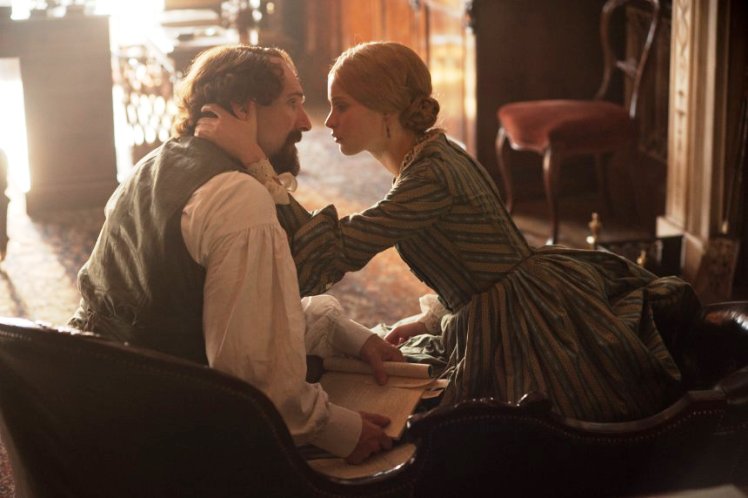 One
of the most telling scenes about Dickens is one he is not in. When
Catherine comes with the jewelry and the wife hands it to the mistress,
is that something that was in the biography? Where did that come from?
One
of the most telling scenes about Dickens is one he is not in. When
Catherine comes with the jewelry and the wife hands it to the mistress,
is that something that was in the biography? Where did that come from?
It's mentioned in the book. There's no proof, but it is a story
that existed and continues to be mentioned in all of his biographies.
Dickens indeed had a piece of jewelry made for Nelly which was then
wrongly sent to Catherine Dickens, and he insisted that she give it
back.
I suppose in his head, he's thinking, "I've done nothing wrong. I'm
not ashamed. Please return it to her." It was always a great scene. It's
a scene that I think we barely touched, because it seems to me to read
so strongly.
The proof of what a great scene it was is when Jones read
it. Within seconds, what I believed to be a good scene was, in her
hands, a great scene.
This
scene is also a meditation on fame and media, in a sense, especially
given the talk about sharing Dickens with the rest of the world. What do
you think of that issue?
The first thing to say, that is really important for the audience,
is that you see in the film what a huge star Dickens was. His readings
sold out.
I think he became addicted to it. He loved an audience not only his
theater audience who he read to, but also his readership which was very
important to him.
This scene is based on the reality of Dickens's relationship with
his reading public, and later on, the people who paid for tickets to
come and see him read.
I think what Abi writes is that you will always be asking yourself
whether it's [a person] or the public that he loves the most. That has a
ring of truth about it. In Dickens's life, he discovered that he wanted
to be an actor at one point and then he became a writer. But then he
discovered that he could read his works and it was a huge success.
In fact, he made two trips to America in his life. The second trip,
made shortly before his death, he came to New York and, as you know, he
was a star. But he was an ill man. His body was breaking down, but I
think he needed this connection with the public.
If
Charles Dickens were alive today, what questions would you ask him?
I would ask him
whether Nelly was the model for any of the heroines in the books he
wrote when he was seeing her, particularly Great Expectations and
Our Mutual Friend. I would love to ask him: is there any truth in
this?